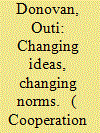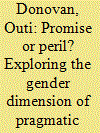| Srl | Item |
| 1 |
ID:
160812


|
|
|
|
|
| Summary/Abstract |
Whilst much has been written on emergence of new norms in international politics, we know significantly less about changes to the ideas and assumptions that underpin such norms. Examined at micro-level, most norms consist of a set of ideas and assumptions that form the basis of what is considered as appropriate, legitimate or even the required thing to do. Far from being stable, ideational constitutions of norms can undergo significant changes in the course of the norm emergence process. Enquiring into such changes is important if we are to move beyond static and linear accounts of norm evolution. Using changes in the ideational constitution of the responsibility to protect – specifically, the de-emphasis of the responsibility to rebuild – as its vantage point, the analysis seeks to answer the following question: what drives change in ideational constitutions of international norms? The chief argument advanced in this article is that misalignments at the level of broader normative structures (external misalignments) and within norms (internal misalignments) result in changes in the ideational constitutions of emerging norms.
|
|
|
|
|
|
|
|
|
|
|
|
|
|
|
|
| 2 |
ID:
189100


|
|
|
|
|
| Summary/Abstract |
International efforts to manage conflict, instability and war-to-peace transitions have undergone a change. Where ‘liberal peace’ once informed peacebuilding strategies, international agencies now frame their work with recourse to ‘sustaining peace’. This change signals a shift towards pragmatism in thinking about conflict and peace-making in the face of the limitations of liberal peace. What is notable in the move to pragmatic modes of peacebuilding is the emphasis on women as agents of peace. While gender-sensitive peacebuilding is not a new concept, the prominent role it plays in the pragmatic peace merits attention. Drawing on feminist pragmatism, I argue that pragmatic peace represents a significant opportunity for shifting peacebuilding practice towards more gender-equal and gender-sensitive modalities. Yet, an investigation into the gender dimension of pragmatic peace in post-Gaddafi Libya, implemented through empowerment programs, finds the promise unfulfilled. While such initiatives have had some successes in supporting women's collective action, capacity-building programs have not only failed to create meaningful opportunities for exercising agency, but have instrumentalized women's participation and reinforced existing patterns of inequality among women. The experiences of those to be empowered suggest that empowerment initiatives fall prey to the type of technocratic and de-politicizing peril that has characterized liberal peace interventions.
|
|
|
|
|
|
|
|
|
|
|
|
|
|
|
|